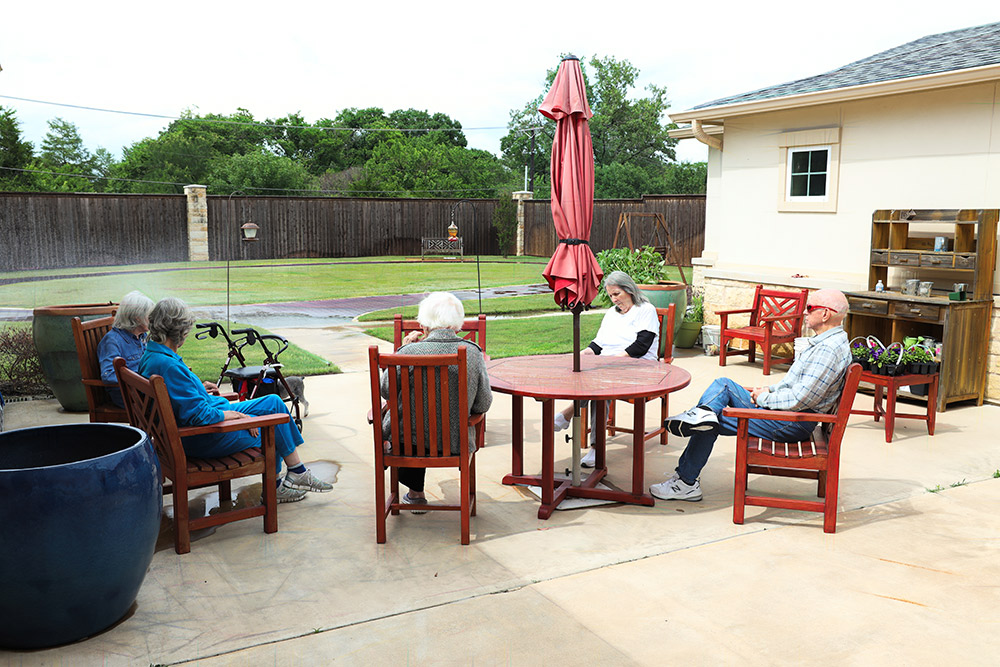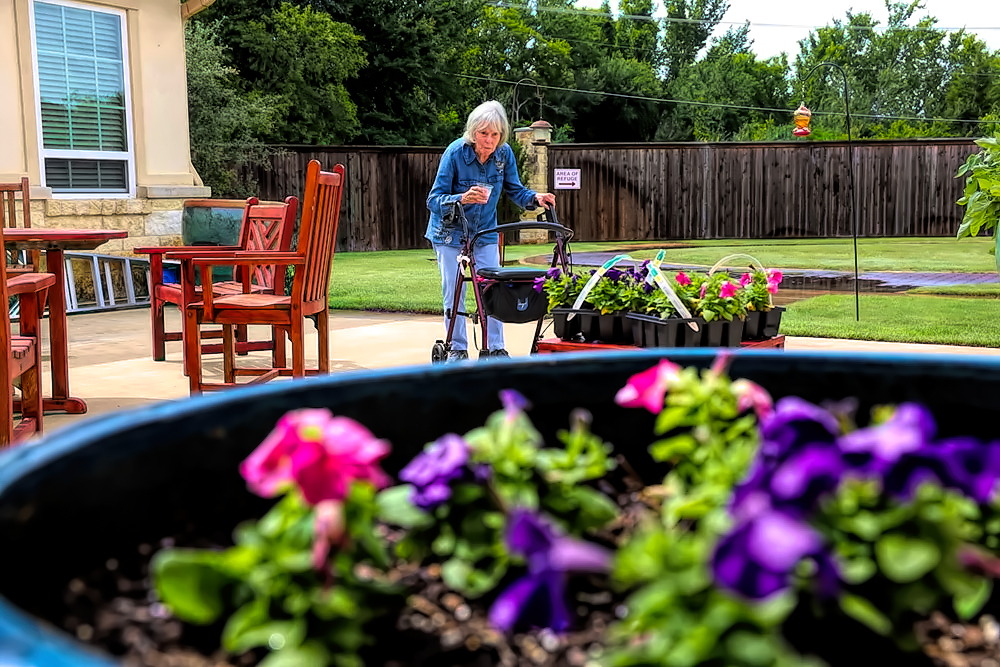Memory Care vs Nursing Home: What’s The Difference?

At the early stages of caring for a loved one with dementia, you might be able to do it all yourself. However, as their condition becomes more challenging, you will require some level of professional help. At this point, most people start to consider living options like a memory care facility or a nursing home.
To make the right decision, you need to understand how memory care residences and nursing homes work and the types of care they provide for family members with health conditions. One of the first things you should keep in the back of your mind is that memory care is quite different from regular assisted living communities. Certified Memory care residences provide certified dementia care services for older adults living with the condition. The Breckinridge is an assisted living facility with a certification in Alzheimer’s and Memory Care.
As you begin your search for the best senior care, here’s all you need to know about memory care vs nursing homes.
What is a Nursing Home?

After hospitals, nursing homes come in second place for caring for older adults with dementia. Apart from providing custodial care like helping patients get in and out of bed, a nursing home also provides a high level of medical care for patients. In addition, they cater to skilled nursing care for patients and people recovering from accidents, such as a broken bone after a fall.
Typically, a nursing facility will have a licensed physician who supervises each patient’s well-being. They also have registered nurses on staff 24/7 and other medical professionals like a physical therapist.
When you decide to move a loved one with dementia into a nursing home, you’re sure they will enjoy good medical care and receive the support they might not have in other senior housing facilities.
What is Memory Care?
Like a nursing home, memory care provides full-time custodial care for patients. But, the critical difference is that memory care specializes in caring only for people with memory loss, dementia, or Alzheimer’s disease.
A memory care facility helps minimize the impact of dementia while enhancing the quality of life of people living with this disease. For example, at The Breckinridge, we train our staff on the best practices for caring for dementia residents and complex dementia behaviors.
Because of their specialization, memory care communities are designed and equipped differently. They have extra safety features like alarms, locked exit doors, and enclosed courtyards to prevent wandering. Their layouts should be simple, with color-coded walls and well-defined spaces to reduce confusion. The Breckinridge facility is designed in a circular pattern that allows residents to move in and out without getting hurt or losing their way.
Memory Care vs Nursing Home Costs and Expenses

Before choosing a nursing home over memory care, and vice versa, you need to know what to expect regarding costs and expenses.
In general, several factors determine the pricing for both types of senior living communities, including their services, location, and structure. For example, a nursing home in an urban area might cost significantly more than one in a rural area.
Estimated Memory Care Costs
The monthly median cost of memory care is $5,250. But as we mentioned earlier, this varies based on the location. A budget of $4,000 to $8,000 a month is most suitable in this situation.
If you have long-term care insurance, a reverse pay mortgage, or some other type of private pay, it becomes easier to pay for your loved one in a memory care facility as soon as they require this type of care.
Estimated Nursing Home Costs
The prices of nursing homes vary based on whether they are private-owned or owned by the government. Governments typically subsidize the costs of their nursing homes, making them cheaper than the private alternative. However, the vast majority of nursing homes are privately owned.
The median monthly cost of a state-owned nursing home is $7,513, while the median monthly price of a private-owned nursing home is $8,517.
Memory Care
Nursing Home
Cost
The average cost of memory care is $5,250 per month. However, depending on your location, you can pay between $4,000 to $8,000 each month.
The monthly median cost of a state-owned nursing home is $7,513, while that of a private-owned nursing home is $8,517.
Activities
The activities in a memory care facility are directed towards helping the patients improve their quality of life.
For example, at The Breckinridge, we encourage socialization and exercises to help the residents maintain their routine.
Nursing homes have fewer activities, mainly because of the health of the patients.
Socialization is encouraged amongst healthier patients. Also, games, movie nights, and mini-musical events happen once in a while.
Staff Training
The staff in a memory-care facility undergo training to know how to care for simple to complex challenges faced by people living with memory loss.
Nursing homes have different medical practitioners, including registered nurses and physiotherapists. Focused training on memory loss is not typical.
Who is it for?
Memory Care facilities provide care for people with dementia and Alzheimers, typically at the middle and later stages of the disease.
Nursing homes are for older adults who require full-time nursing care due to their acute/chronic medical issues.
Level of Care
Care is provided for people in every stage of dementia or Alzheimer’s, including assistance with activities of daily living (ADLs), getting out of bed, getting dressed, medication management, and effective therapies with music and cognitive stimulation.
Nursing homes provide high-level (skilled) assisted care that they cannot get at home from nurses and licensed therapists. This includes custodial care like helping with ADLs like eating, dressing up, and getting out of bed.
Freedom of Movement
Dementia residents can freely move around the facility, with staff oversight as needed. Loved ones can visit as they please.
All main doors and exits are securely locked to prevent residents from wandering away from the community.
Dementia patients cannot move around the facility without staff’s guidance. The doors and exits are kept shut to keep patients from wandering away.
Average number of residents
A memory care community usually has fewer than 50 residents. At The Breckinridge, we limit our homes to just 20 residents at a time.
Typically, memory care communities have from 11–25 people, which allows the trained staff to give residents the best attention and care.
A nursing home houses more people than a memory care community. The average number of residents in a nursing home is 50–200 people or more.
Which is Right for My Loved One?

This is the big question. Ultimately, the choice between a nursing home or memory care comes down to several factors. The most important one here is the nature of your loved one’s illness.
For people with dementia, a memory care facility like The Breckinridge is the better option because it provides specialized care, including memory-enhancing activities that improve the quality of your loved one’s life.
When Should I Choose A Nursing Home?
Nursing homes services have the advantage of providing extensive medical support for the elderly in their care. So, you should choose a nursing home if your loved one has a debilitating medical issue.
Another thing to consider here is the length of time that your loved one would need professional support. The good thing here is nursing homes offer both long and short-term care solutions.
When Should I Choose Memory Care?
The first and most obvious criterion is dementia or Alzheimer’s or a related senior dementia. If your loved one is living with dementia, a memory care facility is where they’ll get all the support they need to help them manage the illness better.
Summary: Memory Care vs Nursing Home
Understanding how memory care is different from how nursing homes work is the first step in choosing the best care for your loved ones. For residents with dementia or Alzheimer’s, memory care communities offer all the support they need as they navigate this phase of their lives.
At The Breckinridge in Lexington Kentucky, we provide specialized, thoughtful, and consistent dementia care in a home-like setting for your loved ones with dementia or Alzheimer’s. Our community is simple, friendly, and welcoming to help residents live the best quality of life.
Contact us today to learn more about our community and vision.




